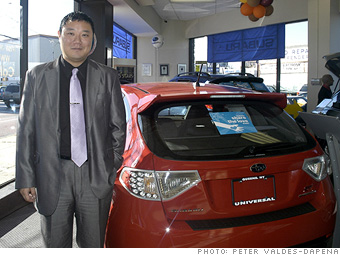
Universal Subaru
"I was one of the very few Korean-Americans in the automobile business," James Park told me, "especially in the Flushing, Bayside area where there were a lot of Korean Americans."
Park started 14 years ago washing cars, he said, and quickly worked his way up to making more than $120,000 a year selling them. He and a partner eventually bought a used-car lot then signed on for a Subaru franchise.
"Last year, we delivered an average of 50 to 60 used cars a month and 20 to 25 new cars a month," he said. Now, business is down to about half of that.
"If I do 50% less volume, then my staff has to go down 50%," he said. "I'm just trying to hold on to the good salesmen I have."
Customer traffic is way down, according to Park. "They're still worried about 'Am I going to lose this job? Can I make it through this Christmas season?' That's what they're thinking."
And he said he can't even get loans for many of the customers who do come in.
"We heard the government is going to bail out the banks and stuff, but we don't feel that because those banks still are not buying this paper," he said, referring to his customers' loan applications.
"We just had a customer that had a 575 score," Park said. "Before, I knew which bank would buy that loan and how we had to put the papers together. Now, I don't even know where to start from."
Dealers up and down the boulevard are competing with each other just to unload their inventory before it becomes a financial burden, according to Park.
"Used cars depreciate so much, so quick," he said. "So every month you're losing $2,000 or $3,000 on each car you have in inventory. We'd rather take a $500 or $600 deal to get rid of the car."
Savvy customers, smelling deals in all the desperation, are driving down already narrow profit margins on new cars. And the Internet makes it tougher, because now customers can figure out his costs.
"If I'm not giving them $500 less than the cost of my vehicle somebody else will," Park said.
No dealer can rely on just new car sales, anymore. Other parts of the business are taking up some of the slack.
"The service business is a little better now," Park noted. "People instead of buying a different car would rather fix it."
Like many auto dealers, Park wants to hold on to see the recovery: "Whoever's going to stand here to see 2010 is going to make some money."
NEXT: Harold Bendell
